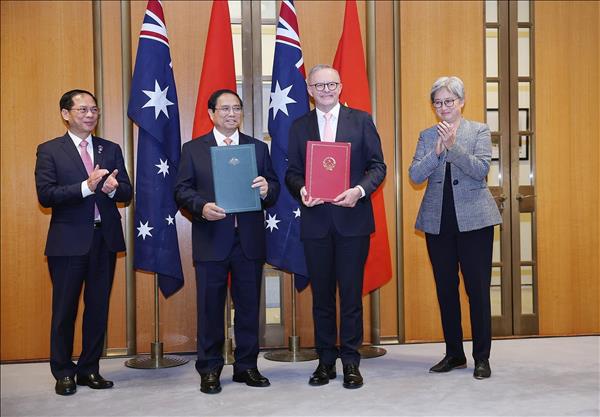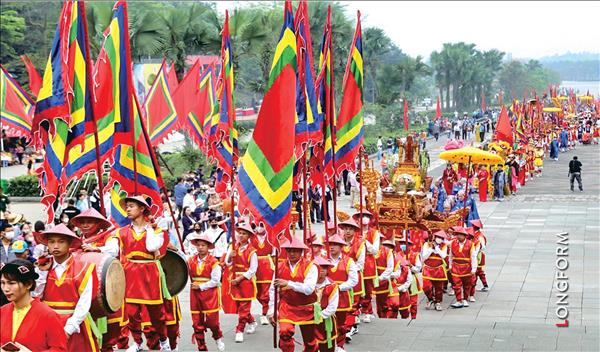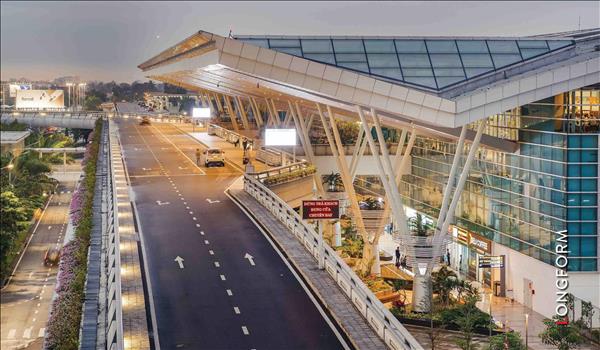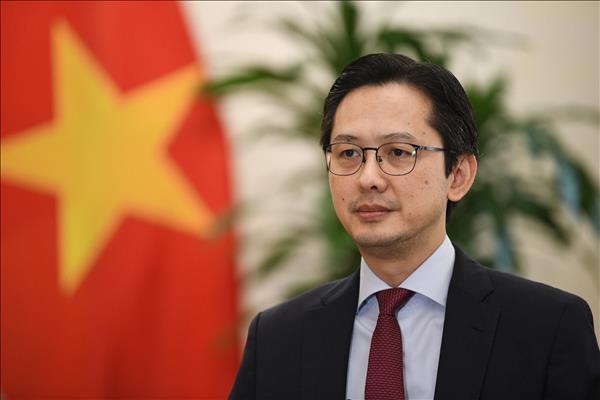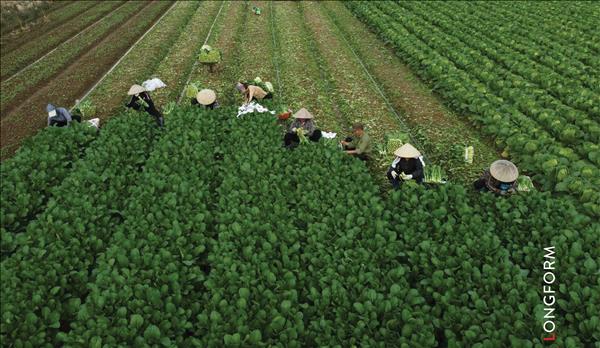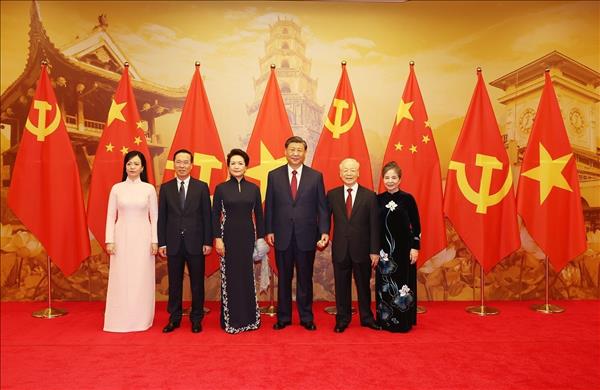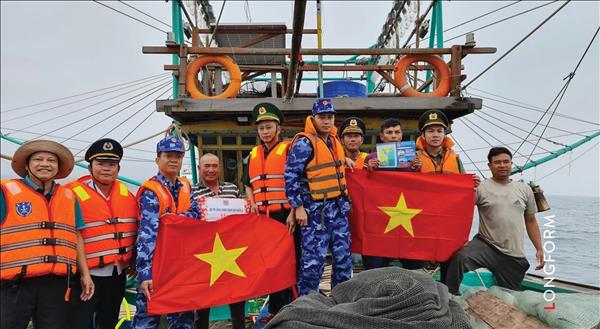During the summits, leaders of ASEAN frankly exchanged opinions on building orientations for ASEAN in the future, bringing into full play ASEAN’s central role, strengthening the intra-bloc solidarity and tightening the relationship with its partners. ASEAN leaders continued expressing their deep concern over recent happenings in the East Sea that erode trust, fuel tensions and harm peace, security and stability in the region.
They also upheld the maintenance of unity and the central role of ASEAN in relations to its partners, and in dealing with challenges and forming a law-based regional architecture.
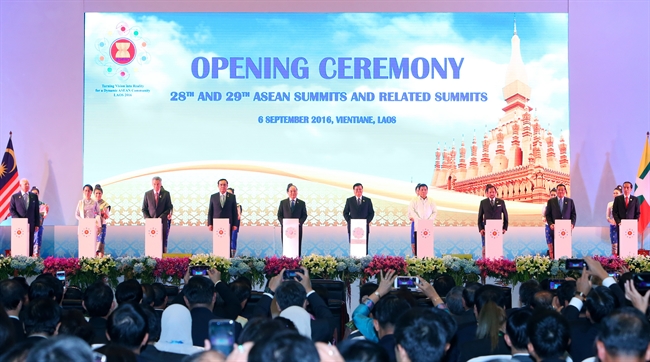
The opening ceremony of the 28th and 29th ASEAN Summits and Related Meetings (from September 6-8, 2016) in Vientiane, Laos.
Photo: Thong Nhat/VNA
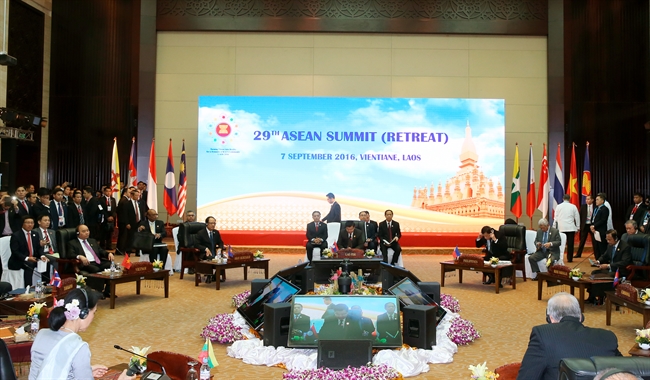
Panoramic view of the 29th ASEAN Summit (Retreat). Photo: Thong Nhat/VNA
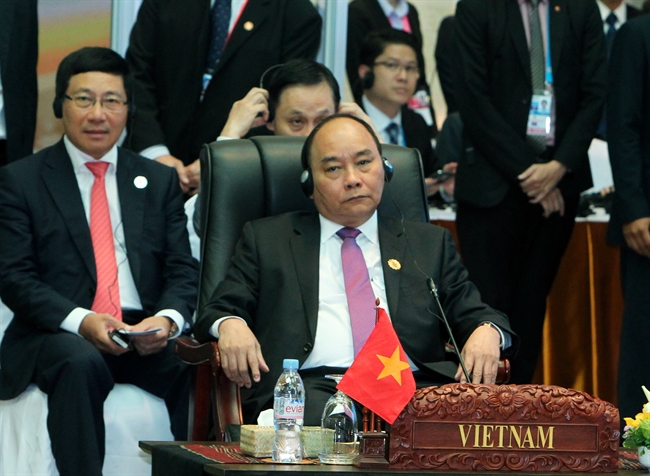
Prime Minister Nguyen Xuan Phuc attends the 29th ASEAN Summit (Retreat). Photo: Thong Nhat/VNA
The declaration also welcomed a joint statement between ASEAN and Chinese foreign ministers on the full and effective implementation of DOC and the application of the Code for Unplanned Encounters at Sea (CUES) and a set of guidelines on the operation of hotlines between senior foreign ministry officials to address emergencies at sea approved at the 19th ASEAN-China Summit in celebration of the 25th anniversary of the ASEAN-China dialogue relations.
However, the leaders expressed deep concern over recent and current happenings, noting the concerns of some leaders pertaining to land reclamation and other actions that erode trust, fuel tensions and harm peace, security and stability in the region.
They reaffirmed the importance of strengthening trust, exercising self-restraint and avoiding actions that could complicate the situation, and pursuing the peaceful settlement of disputes in line with international law, including UNCLOS.
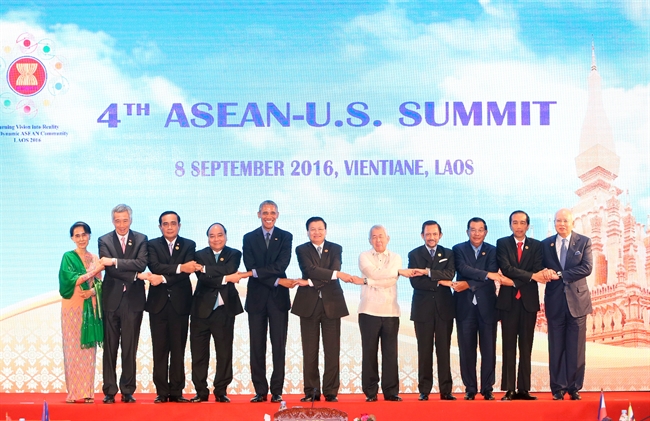
The Prime Minister attends the 4th ASEAN – US Summit. Photo: Thong Nhat/VNA
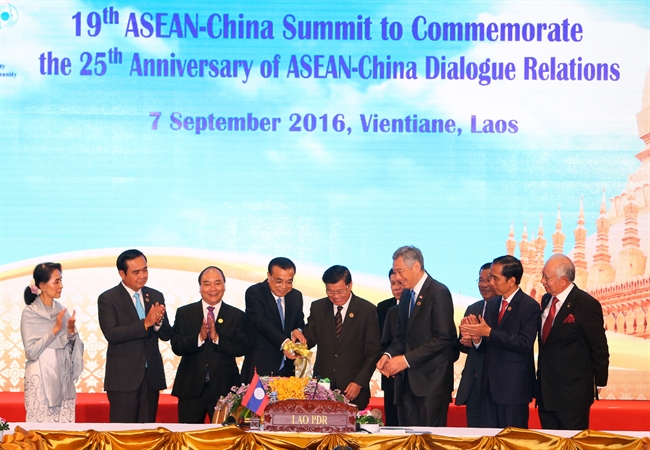
Prime Minister Nguyen Xuan Phuc attends the 19th ASEAN-China Summit to Commemorate the 25th anniversary of
ASEAN – China Dialogue Relations. Photo: Thong Nhat/VNA
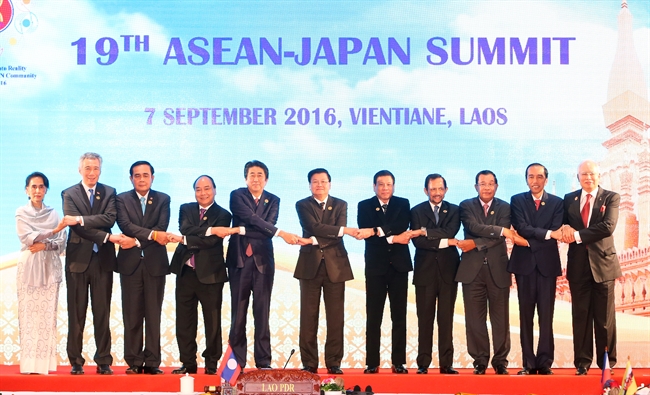
Prime Minister Nguyen Xuan Phuc attends the 19th ASEAN –Japan Summit. Photo: Thong Nhat/VNA
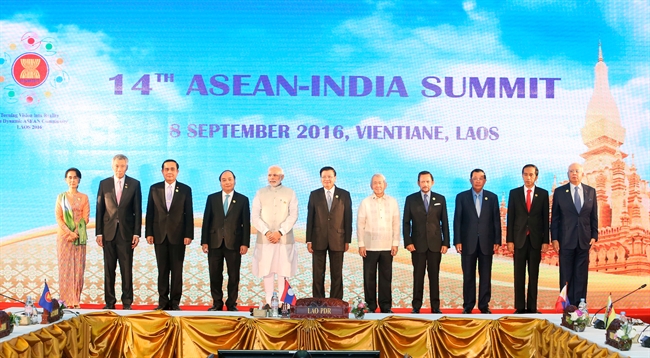
Prime Minister Nguyen Xuan Phuc attends the 14th ASEAN –India Summit. Photo: Thong Nhat/VNA
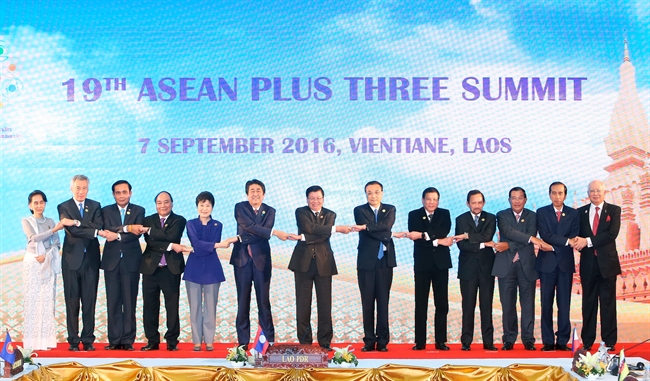
Prime Minister Nguyen Xuan Phuc attends the 19th ASEAN +3 (China, Japan and RoK). Photo: Thong Nhat/VNA
At the summits, Prime Minister Nguyen Xuan Phuc underscored the need to enhance ASEAN’s capacity and self-reliance as well as uphold the bloc’s central role, considering them crucial to ASEAN’s success. He stressed the need of mechanism coordination, to supervise and ensure the effective implementation of agreements; renovating operation of forums, especially forums and security mechanisms in which ASEAN plays a central role; strengthening the capacity of CPR and ASEAN Secretariat; bringing into full play the values and basic principles of ASEAN. Each member has interests and responsibilities for strengthening ASEAN solidarity and unity. They need to harmonize the interests of each ASEAN member country, ASEAN as a whole and strengthen consultations and raise a common voice on regional issues directly impacting regional security and development of ASEAN.
Solving the difficulties and challenges faced by ASEAN counties and others in the world the prime minister stressed the importance of boosting cooperation within the bloc and cooperation with partners, especially in trade, investment, socio-economic development and effectively implementing plans on connectivity and narrowing the development gaps. He also stressed the need for climate change response, water resource security, anti-terrorism and extremism. ASEAN should continue making efforts to uphold its active role in solving the complicated happenings in the East Sea.
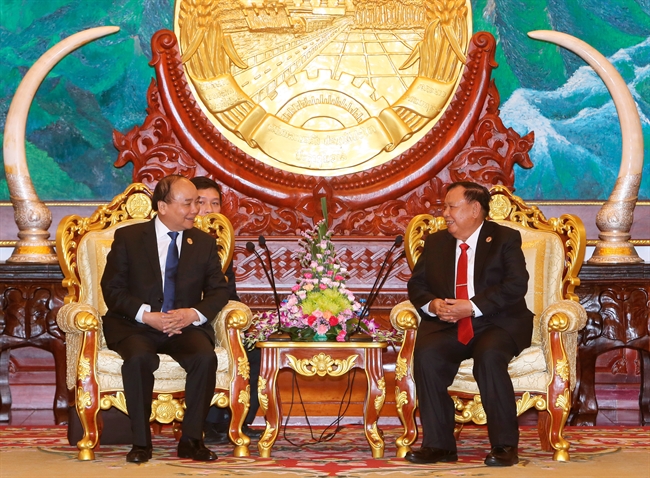
Prime Minister Nguyen Xuan Phuc meets with Lao General Secretary/President Bounnhang Vorachith during his trip to Laos.
Photo: Thong Nhat/VNA
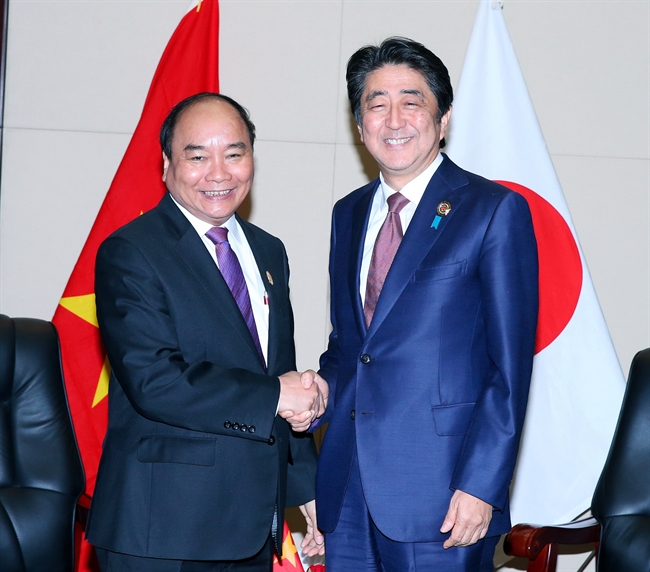
Prime Minister Nguyen Xuan Phuc meets with Japanese Prime Minister Shinzo Abe on the sidelines of the summits.
Photo: Thong Nhat/VNA
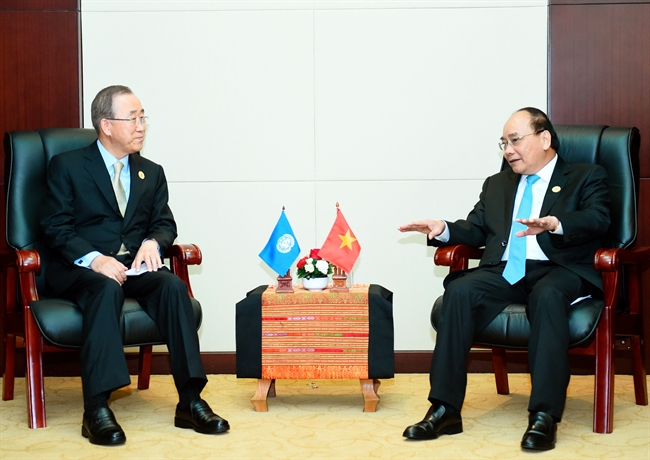
Prime Minister Nguyen Xuan Phuc meets with Un Secretary-General Ban Ki-moon on the sidelines of the summits.
Photo: Thong Nhat/VNA
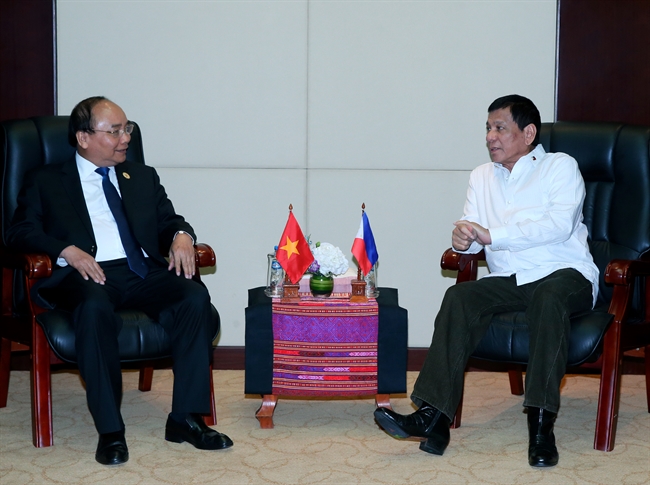
Prime Minister Nguyen Xuan Phuc meets with the President of the Philippines Rodrigo Duterte on the sidelines of the summits.
Photo: Thong Nhat/VNA
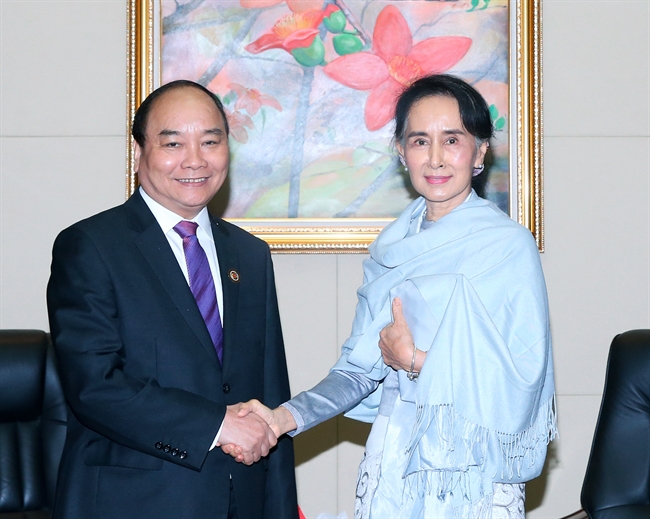
Prime Minister Nguyen Xuan Phuc meets with
Myanmar's Foreign Minister and State Counselor Aung San Suu Kyi. Photo: Thong Nhat/VNA
|
The agenda consisted of 11 summits, including the 28th and 29th ASEAN Summits, 7 ASEAN+1 Summits (with China, RoK, Japan, the US, India, Australia and the United Nations), the ASEAN+3 Summit and the East Asian Summit. There were 57 documents signed and approved in total, in which leaders signed one document, approved 19 documents and recognised 27 other documents. The host country of Laos issued 10 presidential declarations.The 28th and 29th ASEAN Summits and related summits took place in Vientiane, Laos from September 6-8 entitled “Turning Vision into Reality for a Dynamic ASEAN Community”. The summits attracted the participation of leaders of 10 ASEAN member countries, China, Japan, RoK, the US, Russia, Australia, New Zealand and the UN General Secretary. |
By VNA/VNP

